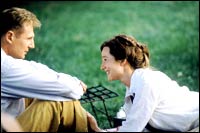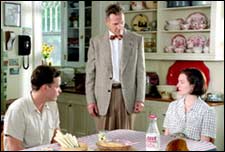Home > Movies > Reviews
Need sex education?
Arthur J Pais in New York |
November 18, 2004 17:43 IST
 Warning: This film is about sex, but don't expect any titillating scenes or erotic talk.
Warning: This film is about sex, but don't expect any titillating scenes or erotic talk.
Also be warned, the movie could be addictive. You may be so engrossed by its topicality, honesty, drama, humanity and indelible performances, that you may be tempted to see it again.
It is witty, and at times wildly humourous: don't miss the scene in which Laura Linney uses a ruler in a doctor's office to hint at the problem in her bedroom.
Here's a movie that takes many surprising turns. Perhaps its most delicious and interesting moments are saved till the very end, when Lynn Redgrave turns up to offer more insights into human sexuality.
Though the film deals with a massive controversy about the open discussion of sexuality that swept America in the 1940s and 1950s, its subject is still topical. There are millions across America who dislike sexual openness, even in monogamous relationships, and sex education, even when it includes instruction on the perils of permissiveness.
And just as Alfred Kinsey, the man who initiated the sex study, was branded a communist during the days of intellectual witch-hunts in the late 1950s and early 1960s, today, too many people questioning the social mores around them, people who question wars and support to war efforts, are suspect in the eyes of the fundamentalist regime in Washington and its supporters elsewhere.
 | More on rediff.com! |  | |
|
To many sexual puritans, Kinsey remains the main target in their effort to put the blame on someone they think unleashed the sexual revolution of the 1960s. They blame him for every possible social problem, from dysfunctional families to AIDS. No surprise, then, that many conservative groups across America have initiated a campaign against Kinsey just as the film, after a robust opening in a few cities, is expanding across the country on the back of excellent reviews.
Director and writer Bill Condon, who won the Oscar for Best Screenplay (adapted) for Gods And Monsters four years ago, has made a gripping film that, however, won't bust box-office records.
But it is already showing signs of turning into an art-house hit and could be on many prominent top 10 lists. Expect it to beat many similarly budgeted screen bios such as Finding Neverland ($30 million to $35 million) at the Oscar nominations.
More than a lively study of a society undergoing turbulent change, Kinsey is a powerful portrait of a scientist, his troubled childhood and tension-filled marriage.
The son of an authoritarian engineering teacher and Sunday school preacher (John Lithgow, admirable as ever), who taught that sex in any form outside marriage brings eternal damnation, Kinsey defies his father's wishes, studies zoology, and becomes a Harvard educated scientist. His obsessions include the gall wasp.
While teaching biology at Indiana University, the socially awkward Prok (his given professional nickname) is attracted to one of his students, the witty and charming Clara McMillen (Linney), and they are soon married.
 Their wedding night would have a dramatic impact on the researcher. Seeing the awkwardness in the bedroom and later, thinking about his meetings with a doctor, Prok wonders why there isn't a detailed and scientific study of human sexual behaviour. The standard literature on sex, he is convinced, are impractical moral tracts, perhaps written by church authorities, more interested in giving people sexual nightmares than making sex a meaningful and pleasurable activity.
Their wedding night would have a dramatic impact on the researcher. Seeing the awkwardness in the bedroom and later, thinking about his meetings with a doctor, Prok wonders why there isn't a detailed and scientific study of human sexual behaviour. The standard literature on sex, he is convinced, are impractical moral tracts, perhaps written by church authorities, more interested in giving people sexual nightmares than making sex a meaningful and pleasurable activity.
His interest soon shifts from wasps to sex.
The socially awkward Kinsey nevertheless teaches his researchers how to get hundreds of men to slowly open up and reveal their sexual histories.
He then sets out to recruit fellow researchers. Into his orbit come the bisexual Clyde Martin (Peter Sarsgaard, the sharp Swedish actor), Wardell Pomeroy (Chris O'Donnell) and the slick-talking Paul Gebhard (Timothy Hutton, seen in a substantial part after many years). Also unforgettable is William Sadler, who plays a pedophile offering to enlighten Kinsey with his own research. Kinsey is a firm believer in opening up the talk on sex, but aghast at the audacity of the pedophile.
One of the more intriguing sequences in the film has Martin, who is sharing a room with Kinsey while studying the gay community in Chicago, trying to gauge where the researcher stands on his scale of sexuality. The 1 to 6 scale metes out 1 to 'exclusively heterosexual' and 6 for 'exclusively homosexual.'
The discussion that follows has quite an impact, not only on the two men but also on Kinsey's wife.
With the 1948 publication Sexual Behavior in the Human Male, Kinsey's work catches widespread attention worldwide, and controversies about his interests and research spring up in no time. His follow-up report on female sexual behavior creates an even bigger outrage.
He soon begins losing support for his research as the donors, primarily the Rockefeller Foundation, pull out. Kinsey takes much of the criticism personally, paying a price with his health.
While Condon effectively captures Kinsey's idealism and the bitter price he pays for it, the filmmaker also has fun examining the social life of the 1950s, and its foibles and inadequacies.
Though the second half loses some of its momentum, Kinsey doesn't take much time to regain it.